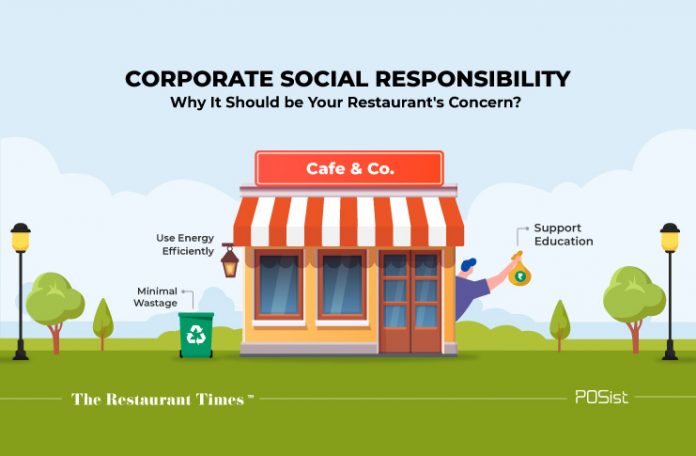With an annual growth rate of 7.2%, F&B is one of the fastest-growing service sectors in the world. According to Statista, Global F&B sector generated a revenue of US$65,495 million in the year 2019. Restaurants and F&B brands across the globe are trying their best to make multiple folds of profits each year. Along with making all that money, restaurant business or any profit-making institute for that matter has a Corporate Social Responsibility (CSR) associated with their brand. CSR suggests that ideally, a company should also think about giving back to the society in one or the other way!
Corporate Social Responsibility refers to the legal actions and operational changes that any business should ideally make to benefit society. There are many ways how a restaurant can serve society by giving a little extra attention to the way they function. For instance, KFC, a quick-service restaurant chain, focuses on waste management, conservation of water and training of their staff to ensure they give back to the environment. There are many other such practices that a restaurant can pick up to play their role in conserving resources or giving awareness to a section of society.
Why CSR?
Researchers found that globally more than 77 percent of consumers prefer to buy from socially responsible companies. Even in the restaurant sector, consumers are willing to pay 5-10 per cent more because of the brand’s commitment to the community.
Adding to the study, KT Prasad, Country Sales Director, Zendesk says “Brands in India have long since understood the importance of maintaining a responsible image as a company to sustain in the ever cluttered and competitive marketplace.”
How Companies Are Catering To CSR?
Catering to their CSR, KFC tries its best to reduce pollution through their operations. The packaging bags are made of 100% recycled paper; all the napkins and serviettes used are all recycled. Each outlet of the brand has thermostats installed to take care of the Carbon emission.
Another example of an Indian hospitality brand taking their CSR pretty seriously is the Indian Hotels Company Ltd. (IHCL). Before even CSR spending was made mandatory under the Companies Act, 2013, the brand has been working to serve communities. They support over 60 traditional silk weavers and social impact organizations through the Taj Value Chain. Along with that, the company also supports three heritage sites and enables indirect employment for over 100 artisans in the country.
Global coffee chains like Starbucks also take CSR pretty seriously. The brand intends to scale up its donation program called FoodShare over the next five years. This targets to around 50 millions meals by 2021. The Coffee chain has been investing extensively on research and quality assurance to develop a method to provide fresh ready to eat food to the needy.
In addition to feeding the needy, Starbucks also plans to minimize the company’s environmental footprint by using less plastic.
“Our hope is by taking this step, other companies will see the possibility for their participation and together we will make great strides in combating hunger,” says Cliff Burrows, group president, Starbucks, USA.
Abiding By The Law
Back in 2014, India became the first country in the world to make Corporate Social Responsibility a mandate, through an amendment to the Companies Act, 2013. Since then, it is mandatory for restaurants and other businesses to invest in some of the other social activity. They could invest in education, donate to the needy, raise issues like gender inequality, hunger, and so on.
According to the amendment, it is now mandatory for companies with a turnover of INR 1000 crores or a market value of INR 500 crores to spend 2 percent of their average profits of last three years on CSR. Before this law, the clause for CSR was only voluntary for companies.
What you can do to take care of CSR at your restaurant
In a conversation with Rajesh Kumar, restaurant consultant and founder of Gourmet Sage, on how to integrate sustainability in a restaurant business model, he suggests various tips that a restaurateur can pick on. Here are some of them!
-
Minimal wastage
The most important thing a restaurant can do to be more socially responsible is to cut down on food waste. Installing a POS system is one way to solve this problem. It helps restaurant owners keep track of their stock, so it’s easy to know what items need to be restocked and how much of each. This keeps people from ordering too much, which can cause food to go to waste.
2. Use energy efficiently
Being a restaurant doesn’t only mean reducing food wastage, but also looking out for other factors like electricity. You can start by making small changes, like letting natural light into your restaurant during the day instead of turning on all the lights. Your restaurant can also keep looking for renewable energy options with the goal of using 100% renewable energy sources.
3. Go green on food – Use GMO-free products for cooking
By making compost out of organic waste, you can return the waste to the environment as nutrients for the soil. This makes the soil more nutrient-rich and reduces the amount of food waste that ends up in landfills. In addition, you can replace refined oil in cooking with GMO-free ingredients such as extra virgin olive oil, avocado oil, and peanut oil. Genetically modified organisms or GMOs are organisms (think plants, animals, microorganisms) whose genes have been transformed using genetic engineering or transgenic technologies.
4. Staff training
All people who handle food are required by law to undergo training in food safety, but this training should also cover waste reduction techniques. According to a report, the leading cause of food waste, improper food preparation accounts for 45% of all food waste. Therefore, staff members must understand proper food preparation, storage, and cooking techniques, as well as how to keep the workplace tidy and prevent cross-contamination.
5. Donate food to the needy
About 1.3 billion tons of food are wasted every year around the world. Food donation programs are an excellent way for restaurants to help their communities directly, and customers see that. Along with that, they can also help your restaurant save money through tax reductions.
6. Support education
A business needs to think about how it can help the community. Along with wasting less food and energy, you can give back to society by educating the poor, for example, by paying for or sponsoring the higher education of your staff.
7. Focus on the 3 Rs – Reduce, Reuse, and Recycle
As a business, your restaurant should put a lot of attention on being environment-friendly. Create a plan to eliminate disposable straws and silverware if your restaurant uses them to cut down on waste. Replace plastic cutlery with silverware that can be cleaned, look into new biodegradable straws that are better for the environment, or try reusable straws.
8. Donate used equipment or decor
Don’t throw out your old stove or kitchen table when you upgrade it with better appliances. Used appliances are always welcome by local charities, schools, and community centres, who can use them to furnish homes and kitchens that need them. Donating equipment has multiple benefits, including helping to divert waste from landfills and potentially earning you a tax deduction.
9. Support your locals – artists and community members
No matter how big or small your restaurant is, there are many ways you can help your community all year long. Want to have a themed night at your restaurant or just give it more style? Talk to artists and musicians in your area about showing their work or putting on live music events. This is also great to get the word out about your business and the artists you’re showcasing.
All in all, a brand’s corporate social responsibility is the company’s accountability to the economic and social sectors of society. Since millennials are willing to contribute in solving multiple social issues like hunger, and climate change, planning activities under CSR has become a mandate for Indian restaurant brands. It becomes a win-win situation when the customers don’t mind paying the extra 5-10%.

















